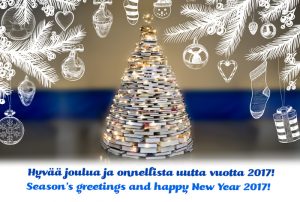I started my master’s degree in the fall of 2016 and since the start I was eager to learn, comprehend, and get to know many discussions and policies at the European Union level related to the Baltic Sea Region (BSR). One place where I was sure to find BSR and its many facets, including regional challenges, opportunities, collaboration, development, etc., being vigorously addressed is the annual EUSBSR Forum (Forum). The Forum’s programme for this year looked promising with its thematic focus on a desired vision for the BSR for 2030. Luckily for me, it was being held on 8-9 November in neighbouring Stockholm, Sweden, therefore I simply did not want to pass such an opportunity.
The day before the Forum, I attended an event, titled NORTHERN DIMENSION IN 2030 – HOW TO GRASP THE OPPORTUNITIES AND FIGHT THE CHALLENGES?, hosted as part of the 18th Baltic Development Forum (BDF). The Northern Dimension (ND) is a partnership between the EU, Russia, Norway, and Iceland on four priority areas (environment, health, transport and logistics, and culture). The ND brought subject matter experts in the field of transport, logistics, health, and environment to tackle policy related subjects in the face of future challenges and opportunities in the North. One of the recurring themes was the need to adapt and leverage the technological advancement in all aspects of commercial and social activities in the North, especially digitalisation. There is an urgency to connect the rural and urban north and bring digitalisation to all aspects of future activities. The key challenge for the regional competitiveness and growth is the sustainability of the workforce, i.e., aging demographics. I was not too surprised upon hearing this but it did highlight the significance of readily available young workforce, in particular, and sustained population growth in the North, in general.
The day of the 7th EUSBSR was packed with activities. I was looking forward to taking a deep dive into the world of BSR especially after attending the ND event the day before. The day started with various workshops and panel discussions taking place concurrently. I chose to attended a panel discussion on human trafficking in the BSR. Speakers were from Poland, Russia, Sweden, and Finland, representing ministerial departments responsible for action on human trafficking in each country. I had, over the years, followed and studied trafficking mechanisms and techniques but was astonished to learn the sophistication of human trafficking in the BSR. The issues relating to human trafficking are as complex as the region itself. Host of countries, including Russia, Estonia, Latvia, Lithuania, and Poland are not only transit states but are source and destination countries for human trafficking. There are number of reports highlighting diversified trends in human trafficking; sexual exploitation, forced criminality, organised crimes, and drug related operations to name a few. Please refer to the recent publication, Human Trafficking 2016 – Baltic Sea Region Round-up, by the Council of the Baltic Sea States (CBSS) for a thorough macro-regional overview of human trafficking as well as regional efforts to curtail it.
Afterwards, I headed to the Creative Lounge and mingled with delegates and presenters from range of field. The day progressed with a networking session while indulging in a sumptuous lunch. The afternoon started with a specially themed session, titled Vision 2030 for the Baltic Sea Region. This is where over a thousand participants heard Stefan Löfven and Juha Sipilä, Prime Ministers of Sweden and Finland respectively, lay out the vision for the development of BSR for the coming decade.
Over the two-day period, I attended workshops and events with topics ranging from economic development, cyclic economy, sustainable development, blue growth, maritime spatial planning, bio-economy, digital market and Startup in the BSR. The information presented and the debates conducted were overwhelming, to say the least. I, by no means, claim to have prior knowledge on many subjects, therefore, I believe that by simply situating myself in above mentioned debates, I had the opportunity to get familiar with the topics I knew very little about. Soon after my return, I restarted my courses which were undertaking environmental, maritime transport, maritime spatial planning, and economic challenges facing the BSR, only this time I was better equipped to take active part in the academic discussions.
Beyond attending workshops, I took part, as a support team, in the successful execution of a panel discussion on the subject of UN SDGs 2030, titled Walk the Talk – Implementing Sustainable Development Goals in the Baltic Sea Region, hosted by the Baltic University Network (BUP). As part of the student group we engaged and pressed panelists on a candid discussion about SDGs as a national policy tool of their respective governments. Upon concluding, we managed to personally interview the panellists. I interviewed Stefán Haukur Johannesson, Permanent Secretary of the MFA, Iceland, where I asked him to explain challenges facing Iceland within BSR while fulfilling SDGs. The interview is available on the BUP YouTube channel: https://www.youtube.com/watch?v=KAMhDL_bQ_E
As part of the Forum, we were invited to a dinner reception, hosted by the City of Stockholm at the beautiful and historic Stockholm City Hall. It was yet another opportunity to speak and get acquainted with the with experts and delegates in the BSR, along with indulging in a traditional Swedish buffet.
I will encourage other students to actively seek and participate in events related to the studies as they add practical and pragmatic element to one’s education and allow us to challenge and validate classroom discussions on a grand stage.
Iftihkar Syed, student, Baltic Sea Region Studies



